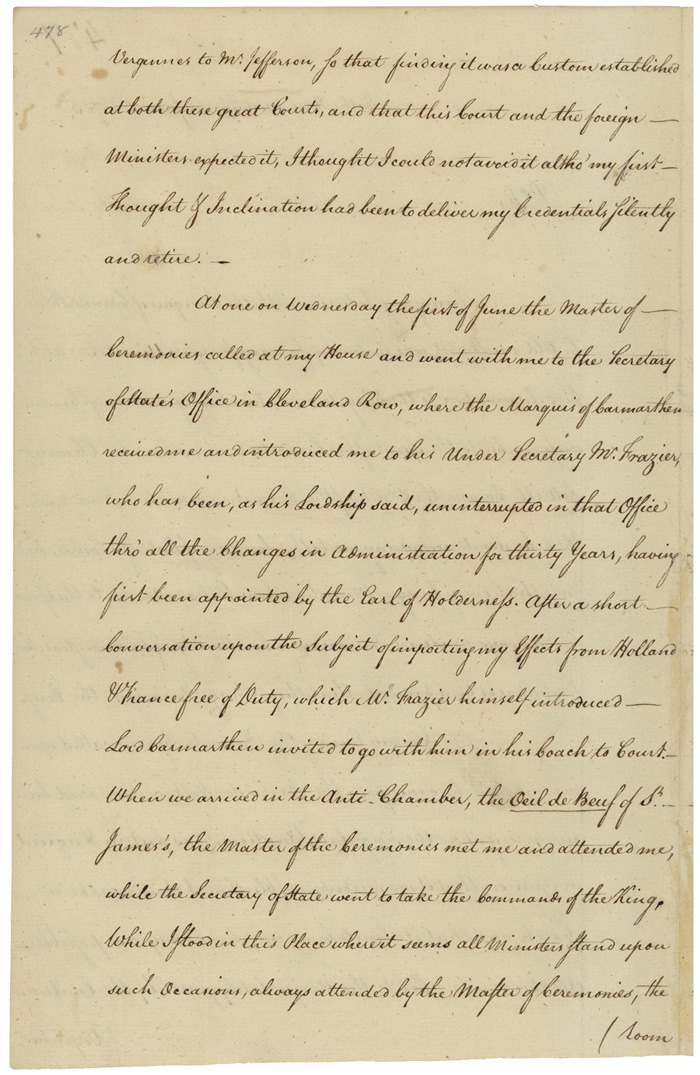 |
| Part of a Letter from John Adams to John Jay, reporting on his audience with King George III source:http://www.archives.gov/exhibits/eyewitness/html.php?section=19 |
Manners and grammar have a great deal to do with politics, in the sense that every language reflects its primary culture, and every culture is shaped by the political realities of how power is allocated in a given society. To a free people, unaccustomed to bowing and scraping, the requirement of showing deference by lowering themselves and changing their posture can be quite humiliating. The Europeans and Americans in the internment camp at Weihsien, Shandong Province, China, during WWII felt deeply abased by having to bow to their Japanese captors, as this was an "alien" practice to the societies from which they came. They thought that no free person, least of all an American, should ever have to bow down to another person. But did you know that the custom of bowing and scraping before others was actually an integral part of the culture from from which they sprang less than two centuries earlier?
John Adams, as Minister to Britain, was required to execute a number of courtly bows before King George III. That he felt a little silly doing this is illustrated by the following clip in which the meeting is dramatized:
Here are some of the words spoken by John Adams to King George III:
“Sir, The United States of America have appointed me their Minister Plenipotentiary to your Majesty . . . It is in Obedience to their express Commands that I have the Honor to assure your Majesty of their unanimous Disposition and Desire to cultivate the most friendly and liberal Intercourse between your Majesty’s Subjects and their Citizens . . . The appointment of a Minister from the United States to your Majesty’s Court, will form an Epocha in the History of England & of America. I think myself more fortunate than all my fellow Citizens in having the distinguished Honor to be the first to stand in your Majesty’s royal Presence in a diplomatic Character . . .”
Notice the grammatical agreement between the noun phrase "The United States of America" and the verb "to have" -- the verb being conjugated in the plural. Also, the possessive pronoun "their" agrees with the plural noun phrase in number. At the time, it was understood that the United States were States which had chosen to be united, and it was clear that they were also divisible. Over time, and especially after the Civil War, as the 10th amendment lost its power, the United States came to be a noun phrase that took singular agreement. Today we usually say "The United States is" and not "The United States are".
http://itre.cis.upenn.edu/~myl/languagelog/archives/002663.html
Language changes slowly over time, so that the distinction between a plural "United States of America" and a singular did not actually arise all in one fell swoop after the Civil War, but some examples of singular can be found before, and some examples of plural remain even to this day in the set phrase "these United States". Nevertheless, a change in the balance of power between the States and the Federal government is clearly reflected in the way Americans use grammatical agreement.
 |
| Excerpt from Ping & the Snirkelly People |
This change in the way the term "United States" is conceptualized can be confusing to innocent language learners and to people who do not understand the entire history of the United States. Likewise, the assertion that the United States are/is indivisible can be confusing to innocent bystanders unaware of political dogma. In my children's book, Ping & the Snirkelly People, the issue comes up unexpectedly when a Chinese girl in an American first grade class room is trying to understand the difficult words in the Pledge of Allegiance, when it is clear that none of the native speaker six-year-olds in her class have any idea what they are chanting each morning.
The division of the United States into independent, sovereign states had been all but forgotten by the time of Lyndon B. Johnson's presidency, when Ping was visiting the country and learning about its ways.
Often, it is the people who are caught up in the change of manners and grammar of their ambient culture who are least aware of the changes. It is easier for an outsider to see what has happened. In order to understand our language, we need to step outside our language. In order to see our culture clearly, sometimes we need to look at it through the eyes of a foreigner.
 |
| Ping & the Snirkelly People |


The book Ping & the Snirkelly People sounds like it might introduce political ideas int an understandable way for young poeple, or people are just learning English.
ReplyDeleteHi, Julia, I think it indirectly does that, but the book is not really about politics so much as language and culture. At the beginning, Ping does not know any English, and we watch her struggle with the language and then the culture. It is also a little bit about literacy and hyperlexia, because Ping has much greater skill at learning to read words than some of her classmates, even though she does not understand much of what she is reading at first. They understand the words, but cannot decode them as well, because they do not conceptualize the words morphologically, the way she does.
DeleteI would be interested in reading and reviewing this book concurrently with the second part of Our Lady of Kaifeng. If you need more people to review it, that is.
DeleteYes, I would be very happy for you to review Ping the Snirkelly People! I will email you about that.
Delete